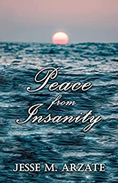
 |
that took me back into a time
when life was real
yet not so true."
In this collection, readers encounter a swath of poems grounded in nature, family, emotional survival, and faith. It opens with the gentle poem “It Seems,” an encouraging piece that advocates for the small moments of pause that seem so rare in life’s daily hustle. Other poems like “Love” rely on minimalism to communicate an urgent message that, despite its availability, not everyone has the opportunity to love. Later in the book, readers encounter selections such as “Musical Notes,” which advocate for the unification of humanity to create “a musical / symphony of peace and harmony.” Other poems question the false realities and moralities society creates in order to justify its actions.
Love, unity, and peace are central themes in the collection. For example, the poem “Healing” suggests that healing is exactly what humanity needs in order to unify and achieve peace. It echoes “Pieces,” which utilizes the imagery of a puzzle to mirror humanity’s complexities. The speaker also recognizes that for the puzzle to be completed, each piece must be correctly placed within it.
The poem “Shaman” offers a spiritual element to the book. It suggests that present societies and peoples should look to the past for important lessons about existence. In it, “Ancient winds gave way to a harsh / modern breeze.” It also suggests that in order to achieve tranquility, one must live as the shaman lived. This poem parallels “Revenge,” which follows “Shaman.” In it, the speaker dreams “of a world of peace,” one filled with “kindness and forgiveness.” It suggests that revenge simply adds to humanity’s problems rather than solves them. This poem corresponds to “Echo.” In this piece, a distant voice attempts to make sense of the violence and horror plaguing the world. The speaker uses cardinal directions like “east” and “west” to show violence’s expanse. Readers encounter another message hidden in the lines: the only way to continue is by moving forward and doing better.
As the collection concludes, faith becomes integral to the speaker’s discussions about the world. In “This World,” readers encounter a speaker who walks “through this dark world” and who prays “for strength and endurance.” For readers looking for spiritual inspiration, this poem is a simple reminder that despite the world’s cruelty, their reliance on their faith will guide them through each day’s adversities. Its philosophies echo the book’s concluding poem, “Peace from Insanity.” In this one, readers encounter a similar idea about surviving in a cruel world bent on destroying one’s light and peace. The speaker shows the schism between the spiritual world and the physical one by reflecting on God as well as on Satan, who “rules the governments of this world.” These observations remind readers who are believers that their hope lies not in the current world but in the next.
The author’s poems are direct and accessible for poetry readers of all backgrounds and ages. Their conversational, personal tone will also appeal to those looking for an everyday take on poetry and life. This collection offers a unique path for readers seeking a unique way to explore their faith and spirituality.